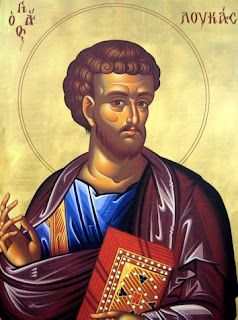Saint Luke, Missionary and Evangelist
 Saint Luke came from Antioch, was a practicing physician and one of the initial converts to Christianity. He accompanied Saint Paul, who converted him, on his missionary journeys and was still with him in Rome when St. Paul was in prison awaiting death. We hear no more of him afterward and nothing is known of his final years. The Church venerates him as a Martyr.The Gospel he authored is principally concerned with salvation and mercy; in it are preserved some of our Lord's most moving parables, like those of the lost sheep and the prodigal son. Dante calls St. Luke the "historian of the meekness of Christ." It is also St. Luke who tells us the greater part of what we know about our Lord's childhood (as relayed by Our Lady).The Evangelist considered his Gospel and the Book of Acts to be one account in two parts. In Acts of the Apostles, we follow Luke's journey in Christian ministry. Much of Acts is written in the third person. However, occasionally, Luke conveys events he had witnessed firsthand. This would help to explain the more detailed portrayals of St. Paul's missionary travels. Luke's account in Acts is the only Apostolic record of the founding of Christianity and the spread of the Good News. Beginning with Christ's Ascension, it chronicles the descent of the Holy Spirit at Pentecost, and the efforts of a nascent Church striving to fulfill its divine mission.According to tradition he was an artist, as well as a man of letters; and with a soul alive to all the most delicate inspirations, he consecrated his pencil to the holiest use, and handed down to us the features of the Mother of God. It was an illustration worthy of the Gospel which relates to the divine Infancy; and it won for the artist a new title to the gratitude of those who never saw Jesus and Mary in the flesh. Hence St. Luke is the patron of painters, sculptors and Christian art.The exact method of his martyrdom is uncertain. The Coptic Orthodox Church contends that he was beheaded at the behest of Emperor Nero. Others say he preached in Greece, and possibly Gaul, before dying at the age 84 in Boeotia. He is also the patron of notaries, physicians, stained glass workers and surgeons, among others. His feast day is October 18th. Lord God, who chose St. Luke to reveal by his preaching and writings the mystery of your love, grant that those who glory in your name may persevere and all may merit to see your salvation.
Saint Luke came from Antioch, was a practicing physician and one of the initial converts to Christianity. He accompanied Saint Paul, who converted him, on his missionary journeys and was still with him in Rome when St. Paul was in prison awaiting death. We hear no more of him afterward and nothing is known of his final years. The Church venerates him as a Martyr.The Gospel he authored is principally concerned with salvation and mercy; in it are preserved some of our Lord's most moving parables, like those of the lost sheep and the prodigal son. Dante calls St. Luke the "historian of the meekness of Christ." It is also St. Luke who tells us the greater part of what we know about our Lord's childhood (as relayed by Our Lady).The Evangelist considered his Gospel and the Book of Acts to be one account in two parts. In Acts of the Apostles, we follow Luke's journey in Christian ministry. Much of Acts is written in the third person. However, occasionally, Luke conveys events he had witnessed firsthand. This would help to explain the more detailed portrayals of St. Paul's missionary travels. Luke's account in Acts is the only Apostolic record of the founding of Christianity and the spread of the Good News. Beginning with Christ's Ascension, it chronicles the descent of the Holy Spirit at Pentecost, and the efforts of a nascent Church striving to fulfill its divine mission.According to tradition he was an artist, as well as a man of letters; and with a soul alive to all the most delicate inspirations, he consecrated his pencil to the holiest use, and handed down to us the features of the Mother of God. It was an illustration worthy of the Gospel which relates to the divine Infancy; and it won for the artist a new title to the gratitude of those who never saw Jesus and Mary in the flesh. Hence St. Luke is the patron of painters, sculptors and Christian art.The exact method of his martyrdom is uncertain. The Coptic Orthodox Church contends that he was beheaded at the behest of Emperor Nero. Others say he preached in Greece, and possibly Gaul, before dying at the age 84 in Boeotia. He is also the patron of notaries, physicians, stained glass workers and surgeons, among others. His feast day is October 18th. Lord God, who chose St. Luke to reveal by his preaching and writings the mystery of your love, grant that those who glory in your name may persevere and all may merit to see your salvation.
